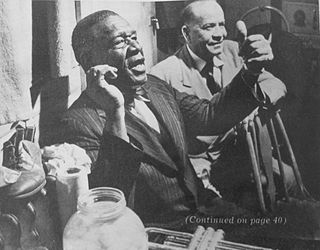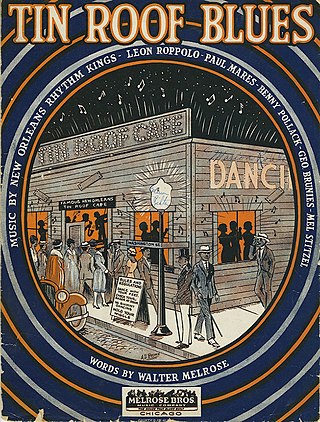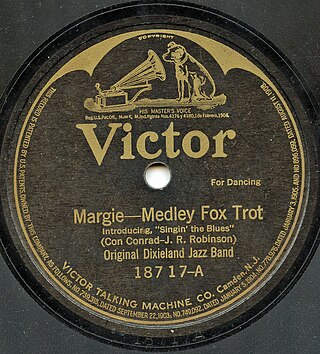Related Research Articles

Joseph Nathan "King" Oliver was an American jazz cornet player and bandleader. He was particularly recognized for his playing style and his pioneering use of mutes in jazz. Also a notable composer, he wrote many tunes still played today, including "Dippermouth Blues", "Sweet Like This", "Canal Street Blues", and "Doctor Jazz". He was the mentor and teacher of Louis Armstrong. His influence was such that Armstrong claimed, "if it had not been for Joe Oliver, Jazz would not be what it is today."

The Original Dixieland Jass Band (ODJB) was a Dixieland jazz band that made the first jazz recordings in early 1917. Their "Livery Stable Blues" became the first jazz record ever issued. The group composed and recorded many jazz standards, the most famous being "Tiger Rag". In late 1917, the spelling of the band's name was changed to Original Dixieland Jazz Band.

A jazz band is a musical ensemble that plays jazz music. Jazz bands vary in the quantity of its members and the style of jazz that they play but it is common to find a jazz band made up of a rhythm section and a horn section.

Jimmie Noone was an American jazz clarinetist and bandleader. After beginning his career in New Orleans, he led Jimmie Noone's Apex Club Orchestra, a Chicago band that recorded for Vocalion and Decca. Classical composer Maurice Ravel acknowledged basing his Boléro on an improvisation by Noone. At the time of his death Noone was leading a quartet in Los Angeles and was part of an all-star band that was reviving interest in traditional New Orleans jazz in the 1940s.

The New Orleans Rhythm Kings (NORK) were one of the most influential jazz bands of the early to mid-1920s. The band included New Orleans and Chicago musicians who helped shape Chicago jazz and influenced many younger jazz musicians.
Leon Joseph Roppolo was an American early jazz clarinetist, best known for his playing with the New Orleans Rhythm Kings. He also played saxophone and guitar.

Alcide Patrick Nunez, also known as Yellow Nunez and Al Nunez, was an American jazz clarinetist. He was one of the first musicians of New Orleans to make audio recordings.
Freddie Keppard was an American jazz cornetist who once held the title of "King" in the New Orleans jazz scene. This title was previously held by Buddy Bolden and succeeded by Joe Oliver.

Alphonse Floristan Picou was an important very early American jazz clarinetist of New Orleans, Louisiana, who also wrote and arranged music.

Charles Ellsworth "Pee Wee" Russell, was an American jazz musician. Early in his career he played clarinet and saxophones, but he eventually focused solely on clarinet.

"Tiger Rag" is a jazz standard that was recorded and copyrighted by the Original Dixieland Jass Band in 1917. It is one of the most recorded jazz compositions. In 2003, the 1918 recording of "Tiger Rag" was entered into the U.S. Library of Congress National Recording Registry.

"Tin Roof Blues" is a jazz composition by the New Orleans Rhythm Kings first recorded in 1923. It was written by band members Paul Mares, Ben Pollack, Mel Stitzel, George Brunies and Leon Roppolo. The tune has become a jazz standard and is one of the most recorded and often played New Orleans jazz compositions.

"Livery Stable Blues" is a jazz composition copyrighted by Ray Lopez and Alcide Nunez in 1917. It was recorded by the Original Dixieland Jass Band on February 26, 1917, and, with the A side "Dixieland Jass Band One-Step" or "Dixie Jass Band One-Step", became widely acknowledged as the first jazz recording commercially released. It was recorded by the Victor Talking Machine Company in New York City at its studio at 46 West 38th Street on the 12th floor – the top floor.
Dixieland jazz, also referred to as traditional jazz, hot jazz, or simply Dixieland, is a style of jazz based on the music that developed in New Orleans at the start of the 20th century. The 1917 recordings by the Original Dixieland Jass Band, fostered awareness of this new style of music.

The period from the end of the First World War until the start of the Depression in 1929 is known as the "Jazz Age". Jazz had become popular music in America, although older generations considered the music immoral and threatening to cultural values. Dances such as the Charleston and the Black Bottom were very popular during the period, and jazz bands typically consisted of seven to twelve musicians. Important orchestras in New York were led by Fletcher Henderson, Paul Whiteman and Duke Ellington. Many New Orleans jazzmen had moved to Chicago during the late 1910s in search of employment; among others, the New Orleans Rhythm Kings, King Oliver's Creole Jazz Band and Jelly Roll Morton recorded in the city. However, Chicago's importance as a center of jazz music started to diminish toward the end of the 1920s in favor of New York.
"Ory's Creole Trombone" is a jazz composition by Kid Ory. Ory first recorded it in Los Angeles in 1921. The band included Ory on trombone, Mutt Carey on cornet, Dink Johnson on clarinet, Fred Washington on piano, Ed Garland on bass and Ben Borders on drums. The recording of "Ory's Creole Trombone" was released by John and Reb Spikes' short-lived Sunshine Records label. It was the first issued recording session by an African American jazz band from New Orleans. Other numbers recorded the same day included "When You're Alone Blues", "Krooked Blues", "Society Blues", "That Sweet Something Dear", "Maybe Some Day" and "Froggie Moore".

Clarinet Marmalade, later Clarinet Marmalade Blues, is a 1918 dixieland jazz standard composed by Larry Shields and Henry Ragas of the Original Dixieland Jass Band. It is played in the key of F major. It was recorded by Fletcher Henderson in 1926 and Frankie Trumbauer in 1927.

"Singin' the Blues" is a 1920 jazz composition by J. Russel Robinson, Con Conrad, Sam M. Lewis, and Joe Young. It was recorded by the Original Dixieland Jass Band in 1920 as an instrumental and released as a Victor 78 as part of a medley with "Margie". The song was released with lyrics by vocalist Aileen Stanley in 1920 on Victor. In 1927, Frank Trumbauer, Bix Beiderbecke, and Eddie Lang recorded and released the song as an Okeh 78. The Trumbauer recording is considered a jazz and pop standard, greatly contributing to Frank Trumbauer and Bix Beiderbecke's reputation and influence. It is not related to the 1956 pop song "Singing the Blues" first recorded and released by Marty Robbins in 1956.
Porter Steele was an American lawyer and musician, known as the composer of the march and later jazz standard "High Society".
References
- 1 2 Evans, David (2008). Ramblin’ on My Mind: New Perspectives on the Blues. University of Illinois Press. pp. 301–302. ISBN 0-252-07448-3.
- ↑ Vic Hobson (19 March 2014). Creating Jazz Counterpoint: New Orleans, Barbershop Harmony, and the Blues. Univ. Press of Mississippi. p. 92. ISBN 978-1-62674-096-9.